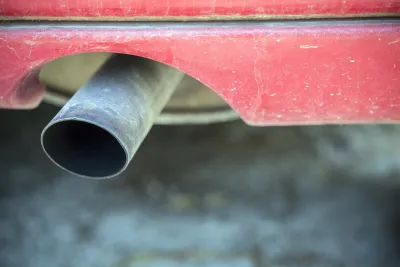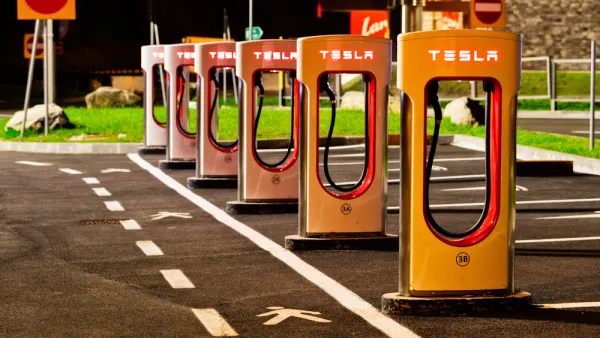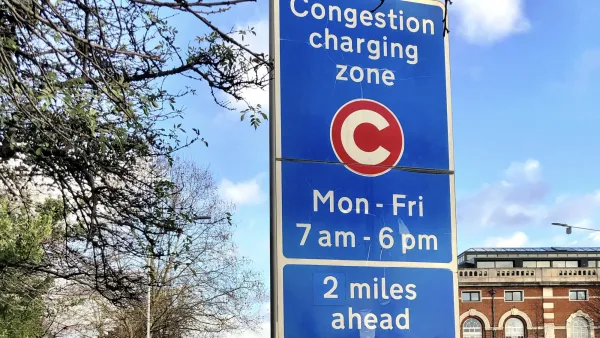Is the movement away from gasoline and diesel-powered cars unstoppable? In response to air pollution litigation, the British government announced on July 26 that sales of gasoline and diesel vehicles would be banned by 2040.

Stephen Castle, London bureau correspondent for The New York Times, reports that the United Kingdom is the latest country to join the environmental movement to ban the internal combustion engine within a specified timeframe. The jointly released announcement from the Department for Environment, Food & Rural Affairs, and the Department for Transport comes after a July 6 announcement by Nicolas Hulot, the French environment minister, that France would also end sales of gas and diesel cars by 2040.
While the goals are the same, the reasons are different. Unlike in France, air pollution, not climate change, was the main impetus.
The strategy document ["Air quality plan for nitrogen dioxide (NO2) in UK (2017)"] was published after a protracted legal battle in which ministers were ordered by the courts to produce new plans to tackle illegal levels of nitrogen dioxide [aka NOx].
In Britain, which is also committed to the Paris treaty, the measures have particular political significance because of rising concern over the level of air pollution, particularly in large cities like London. Poor air quality, much of it a result of pollution from vehicles, is estimated to cause between 23,000 and 40,000 deaths nationwide every year.
The French plan to wean itself from oil-powered cars, on the other hand, "is part of a broader effort to limit global warming," reports The Times' Frankfurt-based correspondent, Jack Ewing. "The country will also stop issuing new oil and gas exploration permits this year, and stop using coal to produce electricity by 2022, Hulot said."
Controversy in British plan
Castle reports that concerns have arisen that 2040 is too long to wait for clean air.
Frederik Dahlmann, assistant professor of global energy at Warwick Business School, stated that the long-term nature of the announcement left a significant question hanging: “How does the government intend to improve air quality and reduce transport related emissions in the short term?”
Critics, including Ed Miliband, a former leader of the opposition Labour Party and an ex-environment secretary, argued that the government was failing to tackle the current pollution crisis
Diesel emissions specifically targeted
The shift away from internal combustion engines is in large part a result of growing awareness of the health hazards of diesel. Diesel engines do spew less carbon dioxide, a cause of global warming, than gasoline engines. But they produce more nitrogen oxides, a family of gases that cause asthma and are responsible for the smog that sometimes blankets London and other major cities.
Cities like Madrid, Munich and Stuttgart are considering diesel bans. Sales of diesel cars are plunging. Political leaders are under pressure to end the de facto subsidies of diesel fuel that prevail in Europe.
Jack Ewing targets the role of the VW emission testing scandal in the fuel's downfall in Europe in his July 25 piece.
Public opinion is turning as consumers become aware of the health hazards. Sales of diesel vehicles are in free fall. Cities [e.g., Madrid, Paris and Stuttgart] are contemplating outright bans.
Stephens ends his piece by writing that there are concerns about the ability of European countries to develop the charging infrastructure and generate enough electricity needed to convert to electricity-powered personal transportation.her countries like Britain will be able to develop the electrical infrastructure needed for such a radical change in the way people travel.
Norway, Netherlands, India, et.al.
In addition to France and Britain, other countries that have recently announced the movement away from diesel and gasoline-powered vehicles include:
-
"India is looking at having an all-electric car fleet by 2030 with an express objective of lowering the fuel import bill and running cost of vehicles - says Piyush Goyal, Minister of Power, Coal New and Renewable Energy and Mines," reported the CarAndBike Team on June 2.
- "Norway wants to phase out sales of new petrol and diesel cars by 2025 using a ‘polluter pays’ tax system, designed to incentivise the purchase of low and zero emission vehicles," reported Sam Sheehan for Autocar, a weekly British automobile magazine in February 2017. An earlier plan called for banning gasoline and diesel-powered passenger vehicles by 2025.
- "The Netherlands, which has an electric vehicle penetration level of around 10 percent, voted to ban all new petrol and diesel car sales by 2025 in a motion passed in April 2016," reported Jason Deign for Green Tech Media.
- "At least 10 other countries have electric car sales targets in place, according to the International Energy Agency," reports Alanna Petroff for CNN Money on July 26.
Auto manufacturers join the bandwagon
Recent developments in July include:
- Volvo announced that beginning in 2019, all new models will be either hybrids or powered solely by batteries,
- BMW announced July 25 that it will manufacture an all-electric mini in Oxford, England.
- Tesla delivered 30 new Model 3 sedans on July 28, priced at $35,000, to its employees who had placed orders. Only half a million more orders to fill.
- A Bloomberg New Energy Finance 2017 outlook predicts that by 2040, electric vehicles (EVs) will outsell petroleum-powered passenger vehicles.
FULL STORY: Britain to Ban New Diesel and Gas Cars by 2040

National Parks Layoffs Will Cause Communities to Lose Billions
Thousands of essential park workers were laid off this week, just before the busy spring break season.

Retro-silient?: America’s First “Eco-burb,” The Woodlands Turns 50
A master-planned community north of Houston offers lessons on green infrastructure and resilient design, but falls short of its founder’s lofty affordability and walkability goals.

Delivering for America Plan Will Downgrade Mail Service in at Least 49.5 Percent of Zip Codes
Republican and Democrat lawmakers criticize the plan for its disproportionate negative impact on rural communities.

Test News Post 1
This is a summary

Test News Headline 46
Test for the image on the front page.

Balancing Bombs and Butterflies: How the National Guard Protects a Rare Species
The National Guard at Fort Indiantown Gap uses GIS technology and land management strategies to balance military training with conservation efforts, ensuring the survival of the rare eastern regal fritillary butterfly.
Urban Design for Planners 1: Software Tools
This six-course series explores essential urban design concepts using open source software and equips planners with the tools they need to participate fully in the urban design process.
Planning for Universal Design
Learn the tools for implementing Universal Design in planning regulations.
EMC Planning Group, Inc.
Planetizen
Planetizen
Mpact (formerly Rail~Volution)
Great Falls Development Authority, Inc.
HUDs Office of Policy Development and Research
NYU Wagner Graduate School of Public Service




























